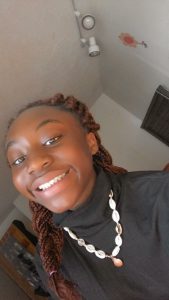
Muna Eze
Being a Nigerian kid in America can be wonderful, but it can also be very difficult. On the bright side, you have a lot of uncles and aunties and they all love you, unless you accidentally walk past them without saying something, especially in the case of my Auntie Udo. In that case, they will call you back and give you a lesson on why you must greet your elders. But when it is your birthday, you are thankful because everyone buys you things. You really feel the love.
But if you have a Nigerian name like most of us, the struggle starts with your name. You can spend all your life explaining your name. One day in fourth grade, it was move-up day. You may be thinking: What’s move-up day? Move-up day is a day when everybody in one grade moves up to the next grade for a short period of time to see what it would be like before they come the next year. This meant that the grade lower than mine (people I barely know) came up to my grade for a period of time. I also got to go to the grade above mine (also people I barely know). The problem was that teachers made us introduce ourselves. I had to do it to both the lower grade kids and the higher grade kids. That can be a nightmare when your name is so different.
Most of my peers in my classroom knew each other from the present school year, but the kids from the lower grades of my school frequently forgot names and had to be reminded several times before they planted it in their brains. My teachers and the new students remembered the simplest names, such as Emily, Emma and Lily. It was never any trouble for them to remember these students’ names. They never had to use the phrase: “Gimme a second,” to remember the most common name in the world. I always thought: Why can’t they remember my name?
My math teacher most likely said something along the lines of: “We’re gonna go around the room and share a little bit of information about ourselves.” We were told to say our names, age, and one thing you would like to learn this year. As the class continued to share their information around the circle, it was not long before it was turn.
“Hi, I’m Muna…” I started. “Did you say Luna or Mona?” someone interjected. I was used to the whole thing, but it didn’t make sense to me why it was so hard to get my name right. Nobody needed to ask Natalie how to say her name. And I had already made it easy for them. What if I make them say my full name “Munachiso”? “It’s Moon, but stick an ‘a’ at the end.” I always said this to people, to make it even easier for them. Mainly so that they didn’t ask again and embarrass themselves.
The most frequently asked question about my name is this: “Why do you go by Muna and not Alicia?” I usually got asked this when people just heard that my first name is Alicia. They usually find this out during attendance, when the teachers start by saying “Ali-” and correct themselves and say “Muna”. I did not understand the answer to the question, so I just told people that there were other Alicia’s in the class. All I really knew about that topic at the time was that my parents told my kindergarten teacher that I would go by ‘Muna’.
These kinds of mix-ups happened frequently. At first, I was a little frustrated. I didn’t get why my name wasn’t on keychains, or Coke bottles, or why I only used my English name for such events as the doctor’s office. So, I started to ask my parents why I was never called by my English name, Alicia. One day I asked my father that question with some seriousness. “Because I don’t know what Alicia means but Muna has a meaning,” he responded. That was the day I learned that my name “Munachiso” means something along the lines of “being with God’ or “walking along with God”. It was not the answer I was looking for. But now that I’m a little older and building my relationship with God, it is making more sense to me.
I started to gain more confidence in my Igbo name when people started to tell me, “Wow! Your name is very unique!” and “Your name is very pretty!” I knew my name was pretty all along, but I got caught up in what others thought of my name and whether others would be able to pronounce my name.
I knew that I would stick to my Igbo name. I really had no choice. I also started to realize that it wasn’t my friends’ fault and that there was no reason to blame them for not being able to pronounce my name. Even when they called me “Mona” or when they made jokes and called me “Mu-Mu”, I learned to appreciate my beautiful name and understand that my parents gave it to me for a reason.
I still don’t see my name on keychains, or coke bottles, but I have learned to embrace it. Now, when I get asked the most frequently asked question about my name, I have an answer ready. I start with this: “Being a Nigerian kid in America is not so easy.”
Muna Eze is finishing 6th grade and looking forward to introducing herself to other 7th graders soon.


This Post Has 9 Comments
She has been my best friend since I walked into the kindergarten classroom and she’s awesome!!! I have a friend group of 4 (we’ve all known each other since kindergarten)and it wouldn’t be complete without you, we have the best laughs together, we are like the best friend group ever😋 good job Mu mu! We ❤️ u!
Omg Muna this is AMAZING I love it so much! Your one of my closest friends and this is awesome!
Muna, you wrote a very interesting article. Congratulations on being published by Nigerian Parents Magazine. I must say, one of the reasons why my friends envy Nigerian girls is the elaborate traditional wedding party. In fact, many of my friends are looking for Nigerian guys because of they call the “money dance” where people spray money on you. Nigerians rock.
Dude you did awesome!!! Very proud of you❤️❤️
Muna, this is incredible. I am happy to learn that you have embraced your Igbo background because it’s rich in history.
I can’t wait for your next article.
Great piece Muna. Very proud of you.
See my little girl Muna has enveloped into this beauty and brains. Dear we are Nigerians and it takes a village to raise a child. Love you baby ❤️
Muna, just to let you know that your story is the story of all Nigerians, kids and adults, who have Nigerian names in the United States, Canada, UK and other places outside the continent of Africa. It never changes anything, Nigerian names are beautiful and meaningful, just as you mentioned in your story. It makes you stand out for good and it also takes you places you can ever imagine.
Personally, I prefer Muna to Alicia, never knew you also go by Alicia. I love your name and your story. I will be looking out for more.
Muna, this is a great article! Thanks for sharing!! I love the meaning of your name! 😍